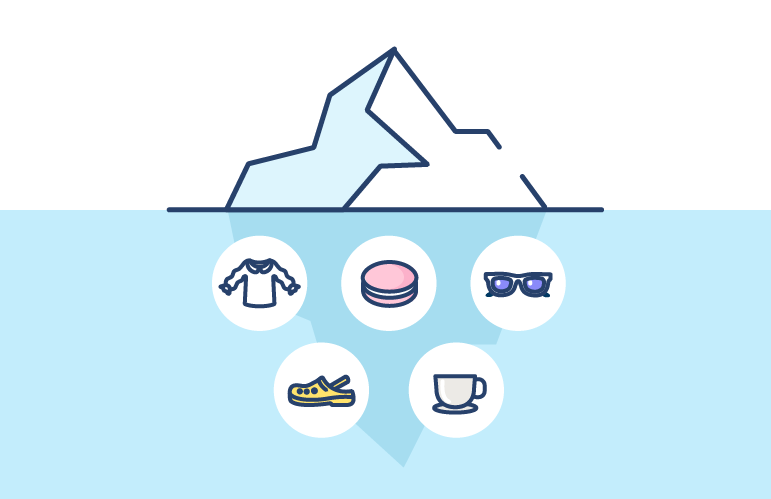Promoting niche products: from nightmare to sweet dreams


Catégorie : Stratégie CRM
It can be a marketer’s worst nightmare. Those singular, challenging products that you don’t dare approach with a 10-foot pole. Sometimes it’s a specialty or segmented item with a narrow consumer base, sometimes it’s a brand new concept with no market history to rely on. Either way, these niche products are typically (and strategically) left out of marketing campaigns altogether, for fear of doing more harm than good.
End result: an entire portion of your catalogue remains under the radar and under-optimized. Couple that with the constant pressure on marketing departments to generate new revenue, and it’s no wonder some of you lie awake at night.
In my years as a marketer I’ve grappled often with this dilemma, just like you probably are. But today, as Customer Success Director at Splio, it’s an issue that I’m able to help our clients solve. Splio’s solution enables marketers to devise effective, targeted campaigns for niche products that would otherwise remain marketing wallflowers, creating entirely new revenue streams in the process.

Sound too good to be true? Let’s take a look at two specific examples from customers I’m currently working with.
Client A is an offline and online retailer. Among its high margin products, high-end wines are one of the most important as they are aligned with Client A’s brand image and strategy.
Now, at over $100 a bottle, this is not “everyman’s“ wine, nor should it be marketed as such. But the tired old strategy of targeting the same limited consumer group who bought the same wines in the past, over and over again, doesn’t make the most of this high added-value item. Similarly, strategies based on purchasing habits tend to oversimplify and under-exploit market potential. But what if there were a way to look outside the box and identify new likely buyers? A strategy that would allow for effective new positioning and promotion?
This is where Splio comes in. Client A’s marketing team was already using Splio for many of its mainstream products and categories, so I suggested testing our Deep AI targeting capabilities to launch a high-end wine campaign. They selected upmarket wines in Splio (labels like Château Montrose 2012, Château Margaux 2011, etc.) and let it look for customers with high purchasing probability in the following days. Our client also decided to create an alternative target using their own customer data. The results exceeded their expectations…

Splio narrowed the client’s target audience by 21%, while achieving significantly higher results across the board in comparison with the test campaign: +53% for the open rate, +166% for the click-through rate, and +58% for the conversion rate. In addition, average order value increased by 60%, and total revenue went up by 435%!

Client B is another retailer, faced with a different marketing challenge: launching a campaign to sell a brand new product both online and in stores. Introducing the Dyson Supersonic hairdryer. It’s shiny, it’s new, there’s nothing else like it on the market… and therefore no data or tried-and-true promotional strategy. What do you do? Send a mass e-mail campaign to every customer who’s ever purchased a hairdryer? Target the entire beauty-supply market? This would be ineffective at best, and at odds with Dyson’s high-design, high-tech brand image. Not to mention the risk of alienating consumers who feel bombarded with items beyond their budget (#unsubscription).
Thanks to Splio, Client B was able to launch a finely targeted marketing operation where previously no promotion would have been possible. Based on Splio’s predictions for purchasing probability in the days following the campaign, the marketing team selected a small subset of their customer base.

For 65,000 people addressed, the campaign achieved a 38% open rate, 1.14% click-through and 4.8% conversion rate. The campaign generated $14,200 in revenue, with a revenue per thousand messages of $198. My client was also happy with the ‘email-to-store’ effect: the email campaign generated three in-store sales for one online. Compared to a row of zeroes, I’d say these results are more than compelling.
Whether it’s a luxury hairdryer, a fancy bottle of wine or any other niche product, our solution allows clients to launch efficiently targeted marketing campaigns. Using Deep AI technology, Splio’s solution detects and processes the implicit signals and hidden patterns in your database, identifying the future buyers for each particular item. And it works for any product that’s had at least 30 sales in the last few months. So now you can put previously neglected products into the perfect spotlight, where they’ll generate maximum revenue.
As smart and easy to implement as our technology may be, Splio doesn’t just hand over a software package and send clients off into the wilderness. Our in-house specialists (Customer Success Managers) bring their expertise to the table and work closely with clients, helping them make the most of Splio. If you have questions about our solution or would like to discuss particular issues you’re encountering, we’d love to hear from you.